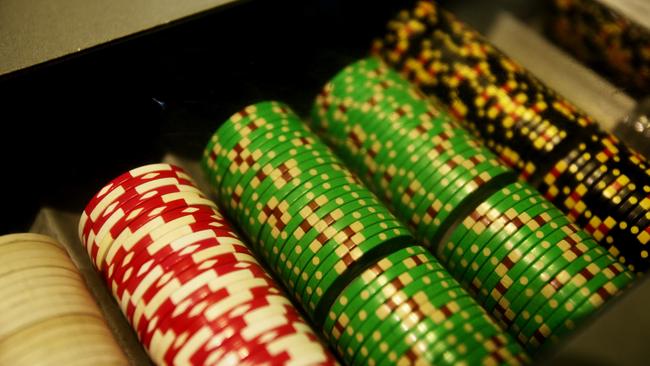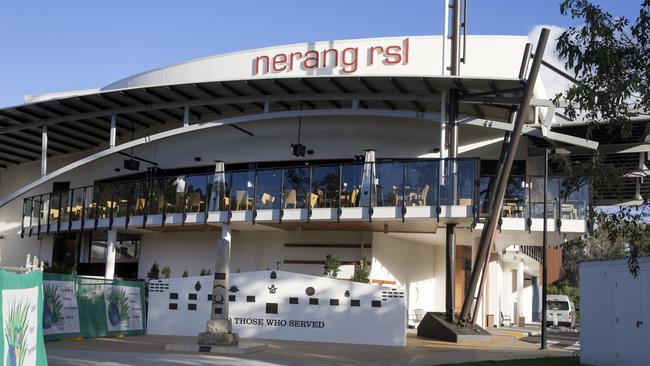Shock report: why the pokies are dying
A secret internal report shows more poker machines may not save the Gold Coast’s struggling club industry.
News
Don't miss out on the headlines from News. Followed categories will be added to My News.
POKER machines will not save the Gold Coast’s struggling club industry with the biggest threats posed by online gambling and poor management, according to a new report.
The Bulletin has obtained the 105-page internal report from consultants KPMG commissioned by Clubs Queensland as it faces competition from a potential second casino on the Glitter Strip.
COAST SECOND CASINO PROTEST: SIGNS WARN “KATE’S NOT OUR MATE”

While much of the debate about a planned global tourism hub has focused on poker machines needed for a new casino, the report warns clubs must offer new entertainment and train up its directors.
A stakeholder told KPMG: “Incompetent management is the biggest threat to clubs.”
Consultants acknowledged that the Newman Government increased the number of electronic gaming machines at a single venue by 20, and from 280 to 300.
But they said increased competition from online gambling and new integrated resorts meant community clubs feared they were “not operating on a level playing field”.
Gamblers were using their mobile telephones for sports betting and consumers wanted more convenient, low cost and accessible food and entertainment options.
SUBSCRIPTION OFFER: GET FULL DIGITAL ACCESS + JABRA WIRELESS

The report highlighted comments by former Queensland Commissioner for Liquor and Gaming David Ford who warned that “gaming machines may well finish up going the way of bingo”.
Club insiders agree that “the pokies are a dying market” and it is impossible to compete with the entertainment provided by casinos and integrated resorts.
Stakeholders in the report “suggested that the revenue from physical EGMs (electronic gaming machines) is in decline”.
Latest research showed 49.1 per cent of Australians gambled in an average three-month period during the years 2017 and 2018, which was a decrease from 50.6 per cent the year before.
Gambling household surveys suggested only 0.51 per cent of Queenslanders were in the problem gambling group, a statistic that had remained static for a decade despite the increase in gambling options.
Clubs had to move away from their business as usual approach and “develop greater commercial acumen and take calculated risks by providing customers with new, unique and satisfying experiences”.
EXTRA POKIES SNEAK ONTO COAST VIA STEALTH

A Clubs Queensland spokesman said it made “good business sense to look at diversified revenue stream”. The findings of the report would be shared with members along with the government.
“If community clubs don’t move to remain relevant, what will you tell your grandkids when they have nowhere to play sport or it is so expensive to participate because sport is simply unaffordable?” the spokesman said.
“How do you fund surf lifesaving patrols, where do our seniors go for mateship?”
The spokesman maintained “the social licence” provided by gaming would remain a cornerstone of the community club offer.
The report focused on the US gambling mecca of Las Vegas as a case study and the push since the late 1990s to remove its “sin city’’ reputation and transform the city into a family-friendly tourist destination with “nightly shows, retail, fine dining and roller-coasters”.
“The results of this successful change to perception is that 80 per cent of total revenue now comes from non-gaming entertainment,” the report said.
“Both Las Vegas and Macau (in China) have benefited from diversifying their tourism offerings into non-gaming entertainment.”
While those cities had focused on high-end products and clubs were concerned with lower price points for families, Gold Coast operators should embrace “new and diverse offerings’’.
Consultants used the example of Eatons Hill Hotel in Brisbane, which opened in 2011 with a 350-seat restaurant, nine bars and a nightclub. Six years later a 4.5 star hotel with 90 rooms was built.

MORE NEWS
Staff resort to prayer as private school rocked
Name of Gold Coast’s newest attraction revealed
Husband loses wife’s prosthetic leg while getting paper
A tourism insider told the Bulletin: “This is proof that integrated resorts like the one being proposed by the government are the best way to grow our tourism industry.
“The Americans have worked it out. With an integrated resort that’s focused on dining, bars and family entertainment, you can lure millions of extra tourists.
“This is exactly the kind of development the government is going after. The pubs and clubs industry is facing extinction. It’s more important than ever before we incentivise the private sector to invest there.”
The KPMG report said the $851 million clubs industry in Queensland was under threat with 164 closures since 2009 and without significant reform “many community clubs will become unsustainable”.
Consultants referred to a Synergies report that predicted additional casino licences including the proposed Coast GTH would result in more than $100 million in lost revenue for clubs and place 63 venues at financial risk.


